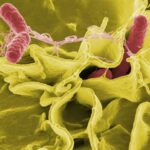Chickens Salmonella is an the most common infection poultry. People who are raising any living chicking or Poultry must know about this risks.
In this article, we will explain what’s the Salmonella, how it infects Chicken, the Chickens Salmonella symptoms & Precaution…
What is Salmonella ?

Salmonellosis (Non S. gallinarum or S. pullorum) – Etiologic Agent:
Salmonellas are ubiquitous, non-spore forming, facultative anaerobic gram negative bacteria.
From more than 2500 identified Salmonella serotypes, only a small portion are commonly found in poultry flocks and poultry products.
Some Salmonella species present in poultry, such as S. enteritidis, S. typhimurium, S. hadar, S. virchow and S. infantis are epidemiologically important because they cause infections in humans.
Read more about Salmonella on?Salmonella Pathogenesis and Progression in the Development of Human and Veterinary Non-typhoidal Salmonella Vaccines Against Human Salmonellosis
Salmonella Infections
Salmonella infections are usually transmitted to humans by consumption of food contaminated with animal feces.
S. enteritidis, in particular, has been considered as the main serotype associated with contamination of table eggs.
But also other serotypes S.typhimurium, S.hadar, S.infantis and S. virchow have also been associated with human infections.
However, affected persons might require rehydration and antibiotic treatment in cases where systemic infection is present.
Poultry Salmonellosis (Chicken Salmonella)
The route of contamination is by oral infection followed by colonization of the gastrointestinal tract (involving enterocytes and lymphoid tissue).
Soon after colonization, bacteremia is observed, with Salmonella detection in several organs, such as spleen, liver, bone marrow, ovaries
and oviduct. Salmonella is excreted in the feces, which constitute an important source of contamination for other birds in a house or other flocks.
In poultry, an age related resistance against Salmonella infections is observed. Factors, such as absence or very na?ve intestinal flora and not fully developed immune system favor early age infection.
Older birds are less susceptible to infection due to the presence complex and well established flora, which competes for receptors or produce metabolic products (bacteriocins) that inhibit Salmonella growth.
Symptomps of Infected Salmonella Chickens
What are the symptoms of salmonella in chickens?
Chickens sick with salmonella will be weak, lethargic, have purplish combs and wattles, a decreased appetite and increased thirst.
Plus you will see distinct white, sulfur yellow or green diarrhea. In some cases, joints might be swollen and blindness might occur from swelling in the eyes. (source 1)
Salmonella germs can make people sick with:
- Diarrhea
- Vomiting
- Fever
- Abdominal cramps
Precaution to avoid Salmonella
In general, you need to keep Salmonella out of your facilities and incrse resistance of the birds.
A Salmonella prevention program includes:
- Pre-harvest (on-farm)
- Post-harvest interventions
Read more about?11 High Risk Points To Watch When Raising Chickens: Risks & Precautions
Let’s focus on Pre-Harvest Backyard Chiken Salmonella. Here some tips for Backyard Chicken Salmonella Preventions:
- Implementation of biosecurity programs including cleaning and disinfection of facilities and equipment.
- Animal proofing the facilities and implemntatioh of pest control programs
- Hatchery anitation programs
- Housing of Salmonella free salmonella chickens
- Chlorination and/or acidification (mineral and organic acids) of drinking water.
- Use prebiotics and/or competitve exclusion
- Heat treatment of feed, reaching temperatures between 70?C and 90?C
- Vaccinate your Poultry againt Salmonella
- Good ventilation of Chicken Coop
- Good Feed Withdrawal !
The main BackYard Chickens Salmonella Precautions
1# Handxwashing
Always wash your hands with soap and water right after touching live poultry or anything in the area where they live and roam.
2# Handle Birds Safely
people with weakened immune systems should not handle or touch chicks, ducklings, or other live poultry
3# SAfely Clean Coops
Clean any equipment used to care for live poultry outside, such as cages or feed or water containers.
4# Poultry Belong Outside
Do not let live poultry in areas where food or drink is prepared, served, or stored
Poultry Salmonella Vaccincation
There is mainly two type of Commercial Salmonella vaccination: Live & Inactived.
Live?stimulate humoral and cellular immune responses, reducing colonization of internal organs and gastro?intestinal tract and decreasing fecal shedding.
Inactivated?vaccines stimulate a strong humoral immune response, inducing high levels of circulating antibodies. The last one provides protection against internal organ and reproductive tract (ovary and oviduct) infection. It also results in high levels of maternal derived antibodies (MDA) into the egg providing passive protection to the progenies or table eggs.
Sources & Reference:?
Read also Chicken Raising FAQ for Beginner, Intermediate & Advanced.